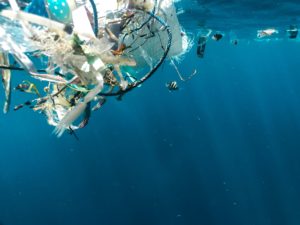Plastic waste can become a habitat for microscopic algae
Plastic pollution in freshwater lakes can become an established habitat for microscopic algae within just two weeks, according to researchers at Keele University.
The researchers placed plastic samples into areas of the water exposed to light (photic) and at the bottom of the lake where there is no light (aphotic) in the Knypersely Reservoir in Staffordshire.
They found that different types of algae developed on the plastics in the photic zone compared to the aphotic zone, and although the type of plastic did not lead to different types of algae, there were changes in the types of algae present in the biofilms over the six-week study.
This is important because plastic pollution in lakes can act as a new habitat for microorganisms such as these and the increased presence of these organisms due to plastic pollution may have greater impacts on nutrient cycling and other organisms living in lakes.
These microorganisms can remove CO2 from the environment and produce oxygen and are key to the cycling of nutrients that drive aquatic food webs.
Plastic samples also showed evidence of degradation within six weeks of being placed in the water, even in the absence of UV light. These findings may indicate that algal biofilms may play a role in helping plastics in the bottom of lakes to break down.
Imogen Smith, lead author of the study said: ‘The negative impacts of plastic pollution on the environment are well documented, particularly in marine environments. However, we identified a distinct lack of research systematically characterising the plastic-biofilm relationship in freshwater environments.
‘Completing the study over six weeks allowed us to look at the evolution of the biofilms over time, which gave us an opportunity to study the implications of its fate in the environment. The findings have identified areas for future research which could help further understand freshwater plastic pollution as a habitat, and the impact of this on its degradation, at a larger scale.’
Dr Antonia Law added: ‘The presence of plastic pollution in lakes provides an additional habitat for microorganisms including algae, which will increase the quantities of these organisms in lake systems. This is important because algae are photosynthetic organisms and play a key role in removing CO2 from the atmosphere and producing oxygen and they also form the basis of food webs in lakes. The increased presence of plastics in lakes along with algae and biofilms may therefore have impacts on nutrient cycling and lake food webs and this is something that requires further research.’
Photo by Naja Bertolt Jensen








